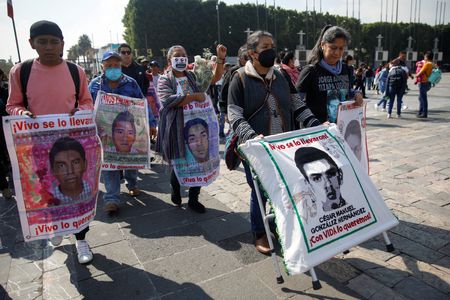MEXICO CITY (Reuters) -Mexican authorities have failed to carry out all arrests ordered by prosecutors over the 2014 disappearance of 43 students and the military has denied access to important information, a rights group said on Friday, expressing concern over continued delays in the investigation.
President Andres Manuel Lopez Obrador took office in 2018 vowing to uncover the truth around the suspected abduction and massacre of the 43 students from the Ayotzinapa Rural Teachers’ College, after his predecessor’s inquiry was riddled with errors.
Last year, a truth commission created by Lopez Obrador called the disappearances a “state crime” that was covered up by members of government. The remains of only three students have been discovered and identified.
The Interdisciplinary Group of Independent Experts (GIEI), human rights experts who have tracked the investigation, on Friday urged the military to cooperate with informational requests, and for prosecutors to issue more arrest orders.
“The case cannot be resolved by withholding information or giving answers that don’t match up with reality,” said Carlos Beristain, one of two current members of the GIEI.
Some public officials for whom arrest warrants were issued as long as six months ago have still not been detained, said GIEI member Angela Buitrago.
She did not say how many arrests were still pending.
“We have insisted on the need for verifying and carrying out these arrest orders,” she told a news conference.
The Attorney General’s office did not respond to a request for comment.
Prosecutors last year called for the arrests of 83 military, police and government officials, among others, with 21 of the arrest orders later withdrawn. The GIEI at the time called the withdrawal “incomprehensible,” and accused the government of interfering with the case.
Buitrago said the GIEI has now sent evidence to prosecutors supporting the arrest orders that were dropped.
The GIEI also accused Mexico’s military of denying access to potential evidence in several instances. The rights experts said the military had told them that certain documents and records did not exist even after the GIEI had obtained some of those same records.
In one case, the GIEI said it had found the transcripts of intercepted phone calls in military archives. When asked about them, it said the Defense Ministry had responded that it does not intercept or monitor calls, and that the information did not exist.
The Defense Ministry did not immediately respond to a request for comment.
Last year, prosecutors filed the first charges against a former high-level official, accusing ex-Attorney General Jesus Murillo of torture, forced disappearance and obstruction of justice. The case is still ongoing and Murillo’s lawyers have denied the allegations.
(Reporting by Lizbeth Diaz and Daina Beth Solomon; Editing by Aurora Ellis and Rosalba O’Brien)





